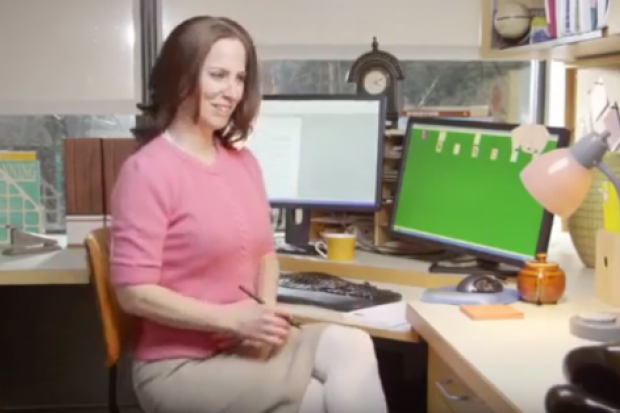"Sweater Day" events are designed to encourage people to wear sweaters in colder months, and to set slightly lower thermostat levels than might otherwise be needed for comfort.
At Simon Fraser University, a video posted by the university to promote the day stunned faculty members with its sexism.
While the origins of the video are under investigation, it was posted to the website of the Canadian university and promoted to faculty members – leaving many wondering how such a thing could have happened.
The video starts with the university's logo and then shows a thermostat being lowered. Then it shows a fictional female faculty member in her office pulling on a pink sweater. A male student walks by, stops and says, "Miss Pinkham?" She says, "Yes, Chad." And he says, "Nice sweater," prompting the professor to smile and laugh to herself. The video ends with the tagline "saving energy is sexy".
The video was apparently made for a previous sweater day but was sent around this year – and the response was immediate.
Elise Chenier, a gender studies scholar who is professor of history at Simon Fraser, used a blog post to summarise many of the objections.
"[A] female teacher is in her office – she is supposed to depict an instructor but is addressed as 'Miss Pinkham,' not doctor or professor – and a young male student stops to compliment her in a sexually suggestive manner. She is flattered, and flustered. Really. No, really. Saving energy is, apparently, a huge turn-on for white heterosexuals, and don’t take my word for it, that’s what the video actually says."
The university took the video down the same day it was distributed and has vowed to investigate why it was placed on the website and promoted.
"As the video was produced by an external vendor, I had not seen it. When I did watch it, I immediately agreed with the feedback we had received that the video is inappropriate, sexist and not in keeping with our equity commitments. We took steps to remove the video as quickly as possible and have followed up with the group who produced and distributed the video to ensure it will no longer be used," said a statement from Joanne Curry, the university's vice-president of external relations.
"We plan to investigate how this video was posted and plan to put into place additional procedures to ensure that this will not happen again."
Chenier, in her blog post, said that the video poses questions about how something like this wouldn't have raised flags.
"When the very place you work promotes the kind of sexism that your intellectual work seeks to contest and ultimately, destroy, you feel like you are being eaten from the inside out,” she wrote.
“There was once a time when I would have seen the video is simply outdated, idiotic and, yes, offensive, but now I see it much differently. Now I feel the harm it does, and not just to Miss Pinkham, but also to her male student, who is encouraged to relate to half the population on such a limited level, and who himself then is defined by his heterosexual desire for women," Chenier wrote.
She concluded: "The collective outrage of female faculty resulted in the video being removed from the SFU website, and that is a very good thing. But how do we get to a place where such a thing never gets up there to begin with?"
Later, Chenier posted a new blog post in which she praised the speedy response and Curry's words in which she called the video sexist. But Chenier also noted concerns about the way some have reacted.
"Remarkably, grumblings were heard among some male faculty members that those of us discussing the matter were wasting our time and we should get back to our 'real' work," she wrote.
"Such grumblings illuminate why so many of us reacted so strongly to what may seem to some an innocuous video. The video is a symptom of the toxic environment in which women work. Male privilege, like white privilege (from which white women also benefit) makes it possible to 'just get back to work'. Why? Because their working environment is not toxic. (Insert nod to the many men and non-gender binary individuals on campus who are very keen to be alert to and contribute to eliminating such toxins.) Sexism poisons our environment, and this makes it harder to 'work.' Indeed, only someone who benefits from sexism could fail to see how calling sexism out is our work...the best job we never wanted."
Register to continue
Why register?
- Registration is free and only takes a moment
- Once registered, you can read 3 articles a month
- Sign up for our newsletter
Subscribe
Or subscribe for unlimited access to:
- Unlimited access to news, views, insights & reviews
- Digital editions
- Digital access to THE’s university and college rankings analysis
Already registered or a current subscriber?






